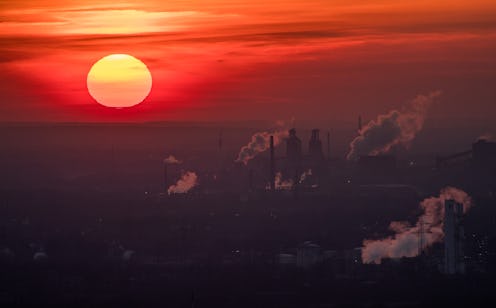News
This Number Should Be A Wakeup Call For Trump

Deregulation, deregulation, deregulation. Along with "travel ban," "build the wall," and "met with Sergei Kislyak," that seems to be the defining word of this young administration. But to actually make America — and the world — great again, the Trump administration may want to set their sights on another issue: pollution. Specifically, they should consider the chilling number of children who die every year from pollution. According to a report released by the World Health Organization on Monday, environmental risks that come from polluted environments account for the deaths of 1.7 million children every year.
Take that in for a minute — and then consider this specific: Air pollution is responsible for the deaths of 570,000 children under five every year. The number of children who die before the age of five from illnesses related to pollution is higher than the population of Philadelphia. Most of their causes of death are preventable, according to the World Health Organization Preventable, that is, with governmental regulations.
Indoor pollution, like second-hand smoke, and outdoor pollution, like the fumes from cars or coal-fired power plants, both contribute to the shocking number of deaths. The United States has both new and old regulations in place to keep the air clean inside and outside, including a regulation that just went into effect that bans smoking in public housing. Will the Trump administration continue support for measures like that, given that Trump already signed an executive order mandating that two regulations be ditched for every new one proposed? I think that's unlikely. Will the Trump administration support the Clean Air Act, given their proposed budget cuts to the Environmental Protection Agency? I think that is also unlikely.
Christine Todd Whitman, head of the EPA, under George W. Bush, said it best. "It’s going to be hard to find [EPA] regulations that aren’t important to protecting human health," she told the Los Angeles Times. Regulatory agencies don't exist just for the amusement of their employees, and they don't put regulations into effect just to needlessly handcuff business.
Sure, taking away a requirement for car companies to make their fleets more efficient will certainly save them, and potentially even consumers, money. But that's missing a huge thing: the societal cost of more air pollution. A true cost-benefit analysis can't just include the business side. In addition to taking the costs to businesses into account, regulatory agencies also have to put weight on the gains to society. These gains can come in many forms, depending on the regulation — think more national park land, cleaner water, more space for pedestrians on the street. But since I'm talking specifically about air pollution right now, I'll just point out one concrete societal gain that comes from regulation controlling air pollution: fewer child deaths.
The World Health Organization report about 1.7 million children ought to be a wakeup call for those caught up in the deregulation craze. The bottom line here isn't just what the CEO of some energy company sees on a spreadsheet. It's about human cost, and they're literally working to make that cost higher.